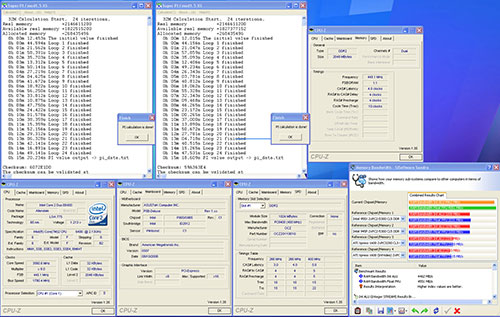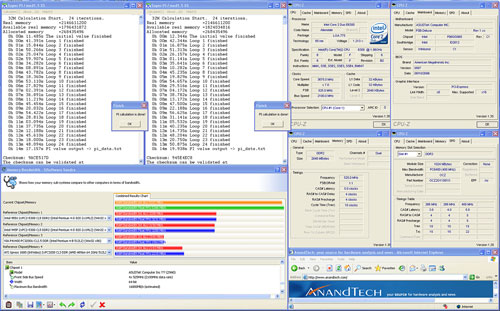ASUS P5B: New BIOS Adds Unlocking & Improved Overclocking
by Wesley Fink on August 24, 2006 3:00 PM EST- Posted in
- Motherboards
As more experience has been gained in overclocking Core 2 Duo chips, it is becoming clear that the 4MB cache E6700 and E6600 do not overclock quite as well as the 2MB Cache chips. There is not a huge difference in the overclocking of 2MB and 4MB at each multiplier, but there is a small advantage to the 2MB design for overclocking. Keep in mind, however, that 2MB performance is lower, so that tends to offset any advantage the 2MB E6400 and E6300 designs might enjoy.
E6400
The E6400 starts at 8x266 or 2.13GHz. With the new 507 BIOS we managed to reach stable speeds of 445x8, 511x7, and 514x6. This composite should give you a better idea of performance at a FSB of 445x8. There is a huge amount of capture information in this image, so you will need to click to enlarge it to readable size.
The jump from 2.13GHz to 3.58GHz is an amazing overclock of 1449MHz, or almost 1500 MHz. Percentage wise, this is a bit more than 68%. With the new ASUS BIOS, we now have the ability to do similar overclocks with the bus speed. With the 6400 the bus speed can now be adjusted from 266 to 514, which represent s a potential bus speed overclock of 93% - almost double the stock 266 FSB speed.
E6300
At $183 the E6300 represents the best value among the Core 2 Duo processors. The 65nm architecture combined with a low starting speed of 1.83GHz presents buyers with some amazing overclocking potential. These capabilities are enhanced further with the ASUS 0507 BIOS.
The E6300 unlocked down and reached 525x7 at stock multiplier. We were very near the limits of the ASUS P5B with the new BIOS and Scythe Infinity air cooling since dropping to x6 only gained us a few more MHz on the FSB, namely 532 at 6X. This is a100% bus overclock and it clearly demonstrates the added flexibility of the lower speed Core 2 Duo chips.
While the 2MB cache E6400 and E6300 reached higher bus speeds and CPU clocks than the 4MB E6700 and E6600, keep in perspective that the 4MB versions perform faster clock for clock. Any advantage the 2MB might have in our testing is small and is more than offset by the 4MB performance advantage. Still, the 2MB models are definitely impressive overclockers and they are both excellent values in the Core 2 Duo line-up.
E6400
The E6400 starts at 8x266 or 2.13GHz. With the new 507 BIOS we managed to reach stable speeds of 445x8, 511x7, and 514x6. This composite should give you a better idea of performance at a FSB of 445x8. There is a huge amount of capture information in this image, so you will need to click to enlarge it to readable size.
 |
| Click to enlarge |
The jump from 2.13GHz to 3.58GHz is an amazing overclock of 1449MHz, or almost 1500 MHz. Percentage wise, this is a bit more than 68%. With the new ASUS BIOS, we now have the ability to do similar overclocks with the bus speed. With the 6400 the bus speed can now be adjusted from 266 to 514, which represent s a potential bus speed overclock of 93% - almost double the stock 266 FSB speed.
E6300
At $183 the E6300 represents the best value among the Core 2 Duo processors. The 65nm architecture combined with a low starting speed of 1.83GHz presents buyers with some amazing overclocking potential. These capabilities are enhanced further with the ASUS 0507 BIOS.
 |
| Click to enlarge |
The E6300 unlocked down and reached 525x7 at stock multiplier. We were very near the limits of the ASUS P5B with the new BIOS and Scythe Infinity air cooling since dropping to x6 only gained us a few more MHz on the FSB, namely 532 at 6X. This is a100% bus overclock and it clearly demonstrates the added flexibility of the lower speed Core 2 Duo chips.
While the 2MB cache E6400 and E6300 reached higher bus speeds and CPU clocks than the 4MB E6700 and E6600, keep in perspective that the 4MB versions perform faster clock for clock. Any advantage the 2MB might have in our testing is small and is more than offset by the 4MB performance advantage. Still, the 2MB models are definitely impressive overclockers and they are both excellent values in the Core 2 Duo line-up.










84 Comments
View All Comments
ZachSaw - Thursday, August 24, 2006 - link
If you're in my position, knowing so much without the liberty of sharing the knowledge, you'll know how I feel. So it's not arrogance. I simply am not allowed to disclose too much. And do feel free to continue speculating. I've allowed you guys to go on for years without intervention, but this simply crosses the line. Anyhow, you probably won't be hearing much from me any more. If I've appeared to you as an arrogant prick trying to guide the authors to the correct path, then so be it.
atenza - Friday, August 25, 2006 - link
I agree with you. I'm sure there is absolutely no way to change the multiplier UPWARDS on a stock E6300-E6700. Given the overclocking potential of any of these CPUs, everyone could simply make his cheaper CPU a X6800 (or X6800 with 2MB cache :) And this really is the last thing Intel wants.Anemone - Thursday, August 24, 2006 - link
The article wasn't really so bad as the criticisms seem to tell, imo. Abusing IST has been around a while I admit but the basis of a stronger memory controller bios still stands and this board is significantly stronger than Gigabyte's in that regard alone.There were B1 steppings that made it to retail, at least according to a few of the recording threads I've seen.
I think the only thing truly sad is that the bios's have been abhorrently buggy on the 975's the 965's and the 590's. People have started to measure which is the "least buggy" which is kind of crazy at the prices these boards are commanding. People need to let these things cool a bit, and mature a LOT, before they're going to be worth what's being asked for them. Only after things have matured and are tested are we really going to see which of all is worthy of the money. And sadly, from what I'm hearing, the 590 is definitely NOT going to be it, so better keep an eye on the other two.
ZachSaw - Thursday, August 24, 2006 - link
Nope.
It's true that Gigabyte sucks when it comes to memory compatibility. But this article is not about that, is it?
If Gigabyte fixes the issues on memory compatibility, and the author writes about it saying that it's the first manufacturer to come out with a bios that is highly compatible with a lot of memory modules, I'll still be ranting about it.
People should own up to their mistakes.
ZachSaw - Thursday, August 24, 2006 - link
Well, perhaps the author shouldn't jump at the very first chance to suck the toe of ASUS' BIOS programmer... check around forums to find out if other manufacturers have this feature as well. A little research is always required before you start writing an article that will be read by thousands of people. It's the author's obligation.Madellga - Thursday, August 24, 2006 - link
Specially when Gary knows that. A coffee chat would do it.bob661 - Thursday, August 24, 2006 - link
Give me SLI on this chipset and I'll kick the upcoming 590 to the curb!Atty - Thursday, August 24, 2006 - link
If ASUS has added this feature for the P5B does that mean that the other boards for Core 2 (most importantly for me the nForce 500's) will have this feature?ZachSaw - Thursday, August 24, 2006 - link
Why's everyone so worried about other boards not having it?It's a very simple addition. Gimme the BIOS source, I'll add it in for u. It's a default 'feature' of the CPU, so whether or not you get it in your board will depend on how diligent your mobo's BIOS programmer is. Shouldn't take longer than 30 minutes to implement and test (internally of course). It's the process of complete validation of a new release that most BIOS programmers fear.
mpc7488 - Thursday, August 24, 2006 - link
Great results, very exciting.